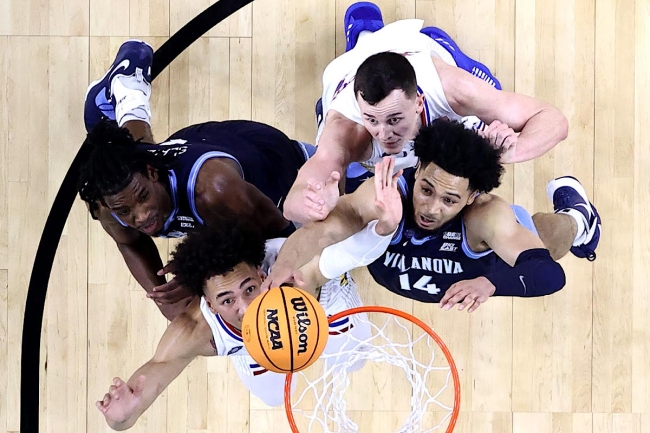You have /5 articles left.
Sign up for a free account or log in.

Since last year’s March Madness tournament, nine more states have legalized sports betting.
Jamie Squire/Getty Images
When the University of Kansas and the University of North Carolina face off in tonight’s NCAA Division I men’s basketball championship game, it will mark the end of a tournament in which more college students than ever were able to wager on their favorite teams.
Since last year’s tournament, nine states have legalized sports betting, bringing to 30 the total number of states that allow adults to gamble, according to the American Gaming Association. Most set 21 as the minimum age. Some 45 million Americans—17 percent of the adult population—were expected to wager a total of $3.1 billion on March Madness this year.
To be sure, the rules on betting on collegiate sports vary widely by state, and only a small share of college students are old enough to gamble anyway. But as legalized sports betting has gathered steam since the U.S. Supreme Court struck down the federal ban on gambling in 2018, college campuses in many states are increasingly caught up in the fervor.
Jacob Spudich, a first-year journalism student at Indiana University at Bloomington, is concerned that online gambling sites are targeting college students.
“I don’t have a problem with sports betting at all,” Spudich said. “But I have a problem with how businesses like DraftKings and FanDuel consistently hammer it into people’s heads … I don’t exactly interact with the ads, but it is everywhere. It’s on social media when I scroll through, and it’s on TV when I try to watch games.”
Spudich said he’s never heard of another student winning a lot of money from a successful bet. On the contrary—he’s seen friends lose money from sports betting, and he worries that some may even struggle with gambling addiction. His concerns prompted him to write an op-ed about gambling addiction for the Indiana Daily Student.
“The hard truth is that the majority of time, when you’re betting, you’re most likely losing money,” Spudich said. “I have friends who have a little bit of a problem, and they lose a lot of money.”
Sports betting became legal in Indiana in 2019 after Governor Eric Holcomb signed HB 1015, making Indiana the ninth state to legalize sports betting. The legislation allowed participants to register online for a mobile sports betting account and set the minimum legal age for sports betting at 21. The state now has 13 online sports betting sites, including DraftKings, FanDuel and BetMGM.
Indiana was in the second wave of states to legalize sports betting after the Supreme Court struck down the Professional and Amateur Sports Protection Act four years ago. Since then, 30 states and Washington, D.C., have legalized betting on professional sports—and nine states have expanded it to in-state college teams.
Some states, such as Louisiana and Michigan, have no restrictions on bets made on in-state college teams. Others, including Colorado and Indiana allow betting on in-state college teams, but not on player proposition bets, which are wagers tied not to the final outcome of a game but to an individual player’s performance.
And some institutions are actively leaning into the legalization of sports betting. In January, Michigan State University announced a multiyear partnership with Caesars Sportsbook, a sports betting app. The partnership grants Caesars naming rights to premium seating sections at Spartan Stadium and to an outdoor tailgating area for football games, as well as signage at MSU football, basketball and hockey games.
In exchange, Caesars will provide its bettors—including MSU students, alumni and employees—exclusive hospitality and VIP experiences through its loyalty program. Caesars will also supply student scholarships and “internship and professional development opportunities” for MSU students pursuing careers in the sports industry, as well as annual funds to support student athlete responsible gaming education.
“The opportunity to partner with Caesars, a leading force in the sports and entertainment industry, will help enhance gameday experiences for Spartan fans and provide significant resources to support the growing needs of each of our varsity programs,” Alan Haller, Michigan State vice president and director of athletics, said in a statement. “We are excited to be on the cutting edge of this innovative opportunity, while recognizing the importance of Caesars’ commitment to responsible sports gaming education both for the student-athletes and the University community as a whole.”
Louisiana State University announced a similar multiyear, seven-figure partnership with Caesars Sportsbook last September. However, some LSU students objected after the university sent an email offering students, faculty and fans $300 in free bets if they made an initial $20 wager through the app.
The University of Colorado at Boulder was among the first institutions to forge a partnership with a sports-book company, signing a deal with PointsBet in September 2020. Since then, PointsBet has announced another partnership, with the University of Maryland.
When asked if sports betting by students had increased at CU Boulder, a university spokesperson said the institution doesn’t track those data.
In a statement to Inside Higher Ed, PointsBet said it does not advertise directly to anyone under 21—including on college campuses: “PointsBet takes responsible gambling very seriously and will lead with that messaging in any outward facing promotion.”
Dangerous for Developing Brains
Gambling experts are raising concerns about these partnerships. College students between the ages of 18 and 25 are particularly vulnerable to compulsive sports betting because their brains are not fully formed, said Christine Reilly, senior research director of the International Center for Responsible Gaming (ICRG).
“Students are often prone to impulsive acts or lack of judgment—and you worry about that with all risky behaviors, such as excessive drinking and so on,” Reilly said. “So sports betting falls in with those other risky behaviors.”
Jeffrey Derevensky, director of the International Centre for Youth Gambling Problems and High Risk Behaviors at McGill University in Canada, said he’s especially concerned about states that permit player proposition bets, since they encourage students to make multiple bets during a game, which can become an addictive behavior. He compared player proposition bets to sitting at a slot machine in a casino.
“Sports wagering used to be discontinuous in the sense that you had to wait until the end of the game to find out if you won or not,” Derevensky said. “Now it’s becoming continuous. And we know that the more the activity is continuous, it tends to engage people more frequently, more often. And so they’re doing sports wagering at a much more rapid rate.”
Reilly said it’s also concerning that most institutions don’t have a gambling policy on campus; ICRG found that only 22 percent percent of U.S. colleges have an explicit gambling policy, while close to 100 percent have an alcohol policy. She said institutions also need to train their mental health professionals to treat students with gambling problems.
“Now that we have sports wagering—for at least ones that are 21 and eligible to participate online—I think it’s a good idea to have a prevention campaign where you warn students that it’s not a risk-free activity,” Reilly said.
Reilly noted that there’s still not enough research on the impact of sports betting on young adults or on how to prevent problem gambling within that population. But she warned that excessive gambling has the potential to derail lives.
“Students go into financial debt,” Reilly said. “They start having poor grades, and it affects their mood. And remember that the minority of students that get into trouble with sports wagering probably are already vulnerable, because they may have other psychiatric problems, like depression.”
Derevensky said some students with a gambling addiction might even be tempted to steal money, sell their personal possessions or sign up for multiple credit cards.
“We know that in extreme cases, young college students have actually dropped out of college because of a gambling problem, or in more extreme cases have actually attempted to commit suicide as a result of their problems,” Derevensky said.
Universities that have formed partnerships with sports-book apps need to make sure there are barriers in place to make sure students don’t get addicted to gambling, Reilly said.
“The universities just need to have a heart-to-heart with the gambling companies and talk to them about what kind of responsible gambling tools can be used to prevent kids from getting into trouble,” Reilly said. “I mean, they clearly already have ways to kick you out if you’re underage, but there are other things that can be done to prevent people from getting into trouble.”
Spudich wants more people to speak out about the dangers of problem gambling. He suggested institutions publicize information about gambling addiction and numbers for help hotlines. Indiana University at Bloomington, Spudich’s campus, hosts the Indiana Problem Gambling Awareness Program, which works to prevent, treat and raise awareness of problem gambling in Indiana.
“The big thing you see on social media, when those ads pop up, or when people post about it, is they always post their wins,” Spudich said. “They never talk about how many people lose. More people lose bets than win, and nobody ever posts about how much they lose.”
Derevensky said that as more states legalize sports betting, it will become more prevalent on college campuses. He pointed to ESPN, which has programming dedicated to sports betting, as one of the reasons for its gains in popularity.
“Many of the states that don’t have legalized sports wagering currently will get legalized sports wagering,” Derevensky said. “It’s inevitable.”
Even so, Reilly said, research from ICRG shows that new forms of gambling tend to have a “novelty effect” that makes them extremely alluring at first, but the thrill eventually wears off.
“You might have more people gambling and you might have more people having gambling problems, but over time, the community seems to adjust to the presence of the new form of gambling, and the rate of problems goes back to where it was,” Reilly said.




